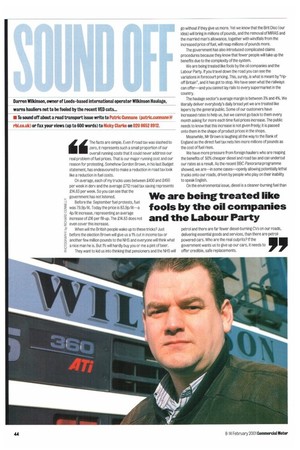d The facts are simple. Even if road tax was slashed to
Page 46

If you've noticed an error in this article please click here to report it so we can fix it.
zero, it represents such a small proportion of our overall running costs that it could never address our real problem of fuel prices. That is our major running cost and our reason for protesting. Somehow Gordon Brown, in his last Budget statement, has endeavoured to make a reduction in road tax look like a reduction in fuel costs.
Before the September fuel protests, fuel was 79.9p/lit. Today the price is 83.9p/lit—a 4p/lit increase, representing an average increase of £16 per fill-up. The 214.83 does not even cover this increase.
When will the British people wake up to these tricks? Just before the election Brown will give us a 1% cut in income tax or another few million pounds to the NHS and everyone will think what a nice man he is. But 1% will hardly buy you or me a pint of beer.
They want to kid us into thinking that pensioners and the NHS will go without if they give us more, Yet we know that the Brit Disc (our idea) will bring in millions of pounds, and the removal of MIRAS and the married man's allowance, together with windfalls from the increased price of fuel, will reap millions of pounds more.
The government has also introduced complicated claims procedures because they know that fewer people will take up the benefits due to the complexity of the system.
We are being treated like fools by the oil companies and the Labour Party. If you travel down the road you can see the variations in forecourt pricing. This, surely, is Mat is meant by "ripoff Britain", and it has got to stop. We have seen what the railways can offer—and you cannot lay rails to every supermarket in the country.
The haulage sector's average margin is between 3% and 4%. We literally deliver everybody's daily bread yet we are treated like lepers by the general public. Some of our customers have increased rates to help us, but we cannot go back to them every month asking for more each time fuel prices increase. The public needs to know that this increase is not given freely: it is passed onto them in the shape of product prices in the shops.
Meanwhile, Mr Brown is laughing all the way to the Bank of England as the direct fuel tax nets him more millions of pounds as the cost of fuel rises.
We have more pressure from foreign hauliers who are reaping the benefits of 50% cheaper diesel and road tax and can undercut our rates as a result. As the recent BBC Panorama programme showed, we are—in some cases—openly allowing potentially lethal trucks onto our roads, driven by people who play on their inability to speak English.
On the environmental issue, diesel is a cleaner-burning fuel than petrol and there are far fewer diesel-burning CVs on our roads, delivering essential goods and services, than there are petrolpowered cars. Who are the real culprits? If the government wants us to give up our cars, it needs to offer credible, safe replacements.
































































































